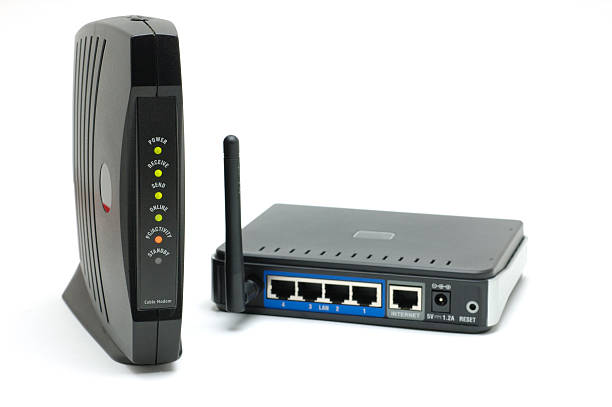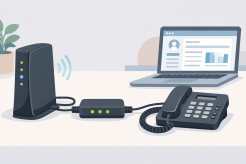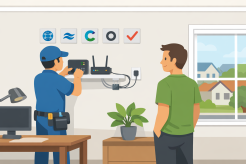Modem vs. Router: What You Need With Cheap Internet Plans

When you’re on a budget and hunting for a cheap internet plan, every dollar matters. But even after finding the perfect plan, there’s a question many people don’t ask upfront: Do I need a modem, a router — or both? Understanding the difference between a modem and a router is crucial, especially when you're trying to keep your setup simple and costs low.
Let’s break it all down — with no fluff, no tech jargon — just the real answers you need to save money and stay connected.
What’s the Difference Between a Modem and a Router?
Many people think modems and routers are the same — but they serve very different functions.
🟢 Modem: Your Internet Translator
A modem is the device that connects your home to the internet via your Internet Service Provider (ISP). It takes the signal from your provider and converts it into data your devices can understand.
📶 Router: The Home Network Boss
A router, on the other hand, distributes that internet signal to all your devices — wirelessly or through Ethernet. It creates your home network, allowing phones, smart TVs, laptops, and even game consoles to connect and talk to each other.
Still confused? Don’t worry — check out this in-depth post on what the lights on your modem and router mean to get a visual understanding of how each device works in real-time.
Do You Always Need Both a Modem and a Router?
Not necessarily.
Some ISPs offer modem-router combo devices, which can save space and reduce costs. However, using separate devices often gives you better speed, more control, and easier upgrades.
If you're using a cheap internet plan, here’s a pro tip: Stick with what’s essential. If you only need to connect one device via Ethernet (like a desktop), a modem might be enough.
Why Modems Matter More for Budget Plans
With low-cost internet options, ISPs often offer basic service tiers that cap speeds at 25 Mbps or 50 Mbps. To get the most from these plans, your modem needs to be compatible with those speeds.
Not sure how to check? Most providers list approved modems on their websites, or you can ask your ISP directly.
If you’re curious about how different types of internet work with modems, this guide on the difference between DSL and Wi-Fi lays it out clearly.
When You Need a Router (and When You Don’t)
If you’re just plugging a single computer into your modem, skip the router. But if you want to connect wirelessly or have multiple devices online at the same time — a router becomes essential.
Here’s when you absolutely need a router:
You’re using smartphones or tablets
You want to stream video on multiple devices
You're working or attending school online
You use smart home devices (Alexa, Ring, etc.)
Pros and Cons of Buying vs. Renting Your Equipment
Renting from the ISP
✅ No upfront cost
✅ Maintenance and replacements covered
❌ Monthly fee (usually $10–$15/month)
❌ Limited control over network settings
Buying Your Own Modem and Router
✅ No monthly rental fees
✅ Better performance and customization
❌ Higher upfront cost
❌ You’re responsible for troubleshooting
On a tight budget? Consider starting with ISP equipment, then upgrade when you’re ready. Over time, owning your equipment can save you hundreds of dollars annually.
Can You Convert a DSL Line to Ethernet? Yes — Here’s How
If your cheap internet plan uses DSL, but you want faster or more stable Ethernet connections at home, converting is totally possible.
Check out this step-by-step guide to converting DSL to Ethernet to learn how to do it without hiring a pro. It’s easier than you think!
Top Tips for Saving on Equipment With Budget Internet
Buy refurbished modem/router combos from trusted retailers.
Stick with ISP-approved models for guaranteed compatibility.
Skip the latest tech unless you need ultra-fast speeds.
Use Ethernet whenever possible for speed without a router.
Monitor your bandwidth needs so you don’t overpay for unused power.
Common Mistakes to Avoid With Cheap Internet Plans
🚫 Assuming all routers are the same – some won’t support your plan’s speed.
🚫 Ignoring modem compatibility – always match the device with your ISP.
🚫 Overpaying for features – skip bells and whistles you won’t use.
🚫 Putting the router in a bad spot – signal strength depends on location!
Final Thoughts: Choose Smart, Save More
The modem vs. router debate really boils down to one thing: what fits your lifestyle and budget best. If you’re only browsing the web or checking email, a modem may be all you need. But if you’re running multiple devices, streaming, or working remotely, a router becomes necessary — even with a cheap internet plan.
By learning how these devices work (and what you can skip), you’ll make smarter buying choices, avoid unnecessary expenses, and get more out of your budget-friendly connection.
Related Posts

Mon, Jan 26, 2026 9:00 PM
cheap internet dealsNegotiate a Better Deal on Your Internet Service Without the Hassle
Learn simple ways to negotiate a better internet deal, reduce your monthly bill, and get the speed you actually need without switching providers.

Fri, Jan 23, 2026 4:45 AM
Internet BundlesDIRECTV Deals and Promotions to Know in 2026
Explore updated DIRECTV deals and packages for 2026. Compare channels, pricing, and promotions to find the right live TV plan for your home.

Thu, Jan 22, 2026 1:24 AM
RegulationsConnect Your Home Phone to Viasat Voice
Learn how to connect your home phone to Viasat Voice with this step-by-step guide. Ensure reliable calls, optimal performance, and troubleshoot common issues.

Wed, Jan 21, 2026 2:42 AM
Internet Bundles cheap internet offersGet Reliable Rural Satellite Internet with Viasat
Get reliable rural satellite internet with Viasat. Explore current plans, speeds, pricing, and tips to choose the best option for your home.

Wed, Jan 21, 2026 12:44 AM
Technology Broadband InstallationInternet Provider Installation FAQs: What to Expect and How to Prepare
Learn what to expect from internet provider installations, including AT&T, Spectrum, Cox, Optimum, and Verizon Fios. Self-install vs professional setup explained.